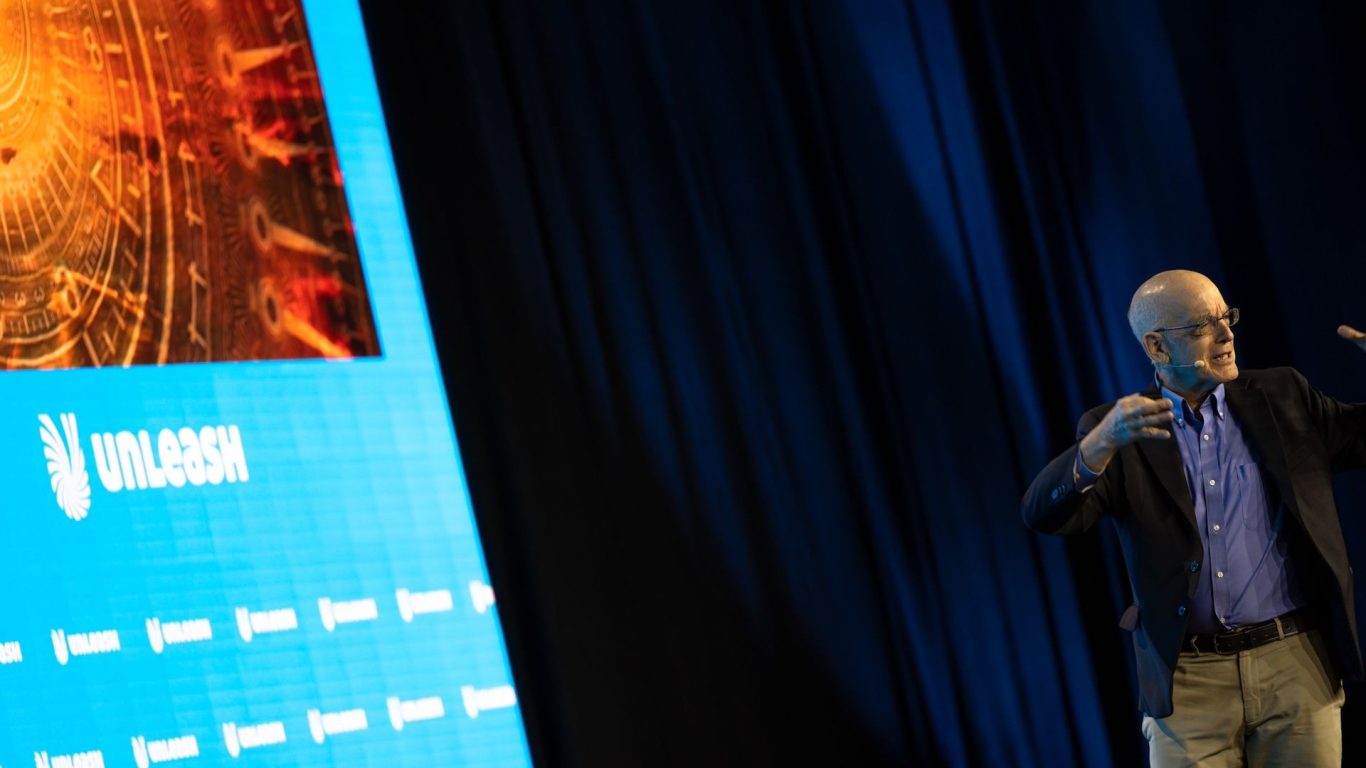It’s time to unleash HR
Not just tweak it, according to UNLEASH World 2022 day two closing keynote Gary Bolles.
Why You Should Care
Singularity University's Gary Bolles closed out UNLEASH World 2022.
He spoke about how the rules of work need to change.
And how HR must be at the forefront of the future of work.
After two days of fantastic sessions with speakers from the world’s largest companies, UNLEASH World 2022 came to an end. Closing out this year’s Paris show was Gary Bolles, author and chair for the future of work at Singularity University.
Bolles contemplated what the world will look like in 2050 – he joked that Elon Musk will still be trying to decide whether to buy Twitter, as well as attempting to persuade his employees to return to the office.
On a more serious note, the organizations of the future will be very different from those of the past. They will not be defined by “solid walls”, but instead as a “flow of talent” and “the incredible capacity of humans channeling their energies to create value for organizations”.
“My hope for the future is that the organization is the whole person, it is a group of people that all completely understand their capacity to be able to solve problems for the organization”, stated Bolles.

Gary Bolles speaking at UNLEASH World 2022.
In this context, the traditional role of managers or supervisors will disappear – they will be replaced by a “team guide”. This new role isn’t required to know all the answers, instead they ask the right questions of their team of expert problem-solvers.
This democratizes organizations because it means “whenever there’s a problem to be solved, anybody inside the organization can be part of the process of solving those problems”.
Plus, according to Bolles, it is crucial that “everybody within the organization understands how their energies are creating value for the organization” and its business bottom lines.
Technology is a crucial element of organizations of the future – but importantly, tech won’t be replacing humans, instead it will help them do their jobs even better.
This is because technology helps humans “to be able to develop superpowers, to understand our own superpowers, and to collaborate with others on their superpowers”.
Setting the new rules for the workplace
As organizations transform over the next three decades, how does that impact the role of HR?
Bolles is very clear: “Don’t just tweak HR, unleash it”.
To do this, there needs to be a shift in mindsets, skillsets and toolsets that organizations use.
It is crucial to get everyone in an organization to break out of their day-to-day mindset and focus on what’s coming next, or the never normal, as Peter Hinssen terms it.
We are living through exponential change – we are seeing more and more so-called “black swan” events, or big shifts, than ever before. “My friend, Shelly Palmer, has got a great line; ‘today is the slowest day of the rest of your life’”, shared Bolles.
As a result, everyone needs to shift their mindsets in order to better deal with constant change and disruption; individuals also need to adjust their skillsets and toolsets.
Do you need to work nine to five Monday to Friday? What’s the best way (and where’s the best place) for you to collaborate?
Of course, the old rules and mindsets are still very much alive and kicking. A tug of war is happening between the CEOs of organizations like Goldman Sachs, Starbucks, Tesla and Salesforce, Twitter.
But this is an opportunity for HR to come into its own and to “be the platform where co-creation occurs”, and ensure that leaders trust that employees are problem solving and creating values, but also giving employees the agency to make their own decisions about when, where and how they work.
As a HR changemaker, you need to zoom in and zoom out – aka take the short-term and the long-term view of the organization. The latter includes baking HR more closely into the fabric of the organization.
The HR department will not just lead the changes necessary for the future of work, but they can “be that change”.
Sign up to the UNLEASH Newsletter
Get the Editor’s picks of the week delivered straight to your inbox!

Chief Reporter, UNLEASH
Allie is an award-winning business journalist and can be reached at alexandra@unleash.ai.
Contact Us
"*" indicates required fields
Partner with UNLEASH
"*" indicates required fields